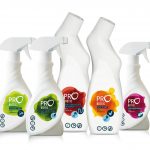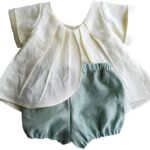The German adage says it all: “Good health starts in your gut.” This means one thing in particular: The more stable your digestive tract, the better armed your body is to fight off disease. The German Society of Nutrition recommends 30 grams of fiber per day. Just about everyone now knows that fiber is healthful and good for the digestive tract, but people generally continue to eat a lot of low-fiber foods. Nevertheless, the producers of non-alcoholic beverages can offer some help with innovative high-fiber drinks.
The German Society of Nutrition has some no-nonsense advice for people. Individuals who consume a lot of fiber can reduce their susceptibility to diseases that are related to diet: problems like obesity, hypertension, and coronary heart disease. Nonetheless, a large number of people continue to ignore society’s recommendation that adults should consume at least 30 grams of fiber a day.
According to society, about 75 percent of women and 68 percent of men fail to reach this goal. As a rule, people can increase their fiber intake by eating large amounts of fruit, vegetables, and whole-grain products. The society also shows people how to hit that target: “You can reach the goal of consuming at least 30 grams of fiber each day by eating three slices of whole-grain bread, a portion of fruit granola, two to three medium-sized potatoes, two medium-sized carrots, two kohlrabis, an apple and a portion of red berry compote (rote Grütze).”
In today’s fast-paced world, many people cannot find the time to eat such generous meals. This creates the perfect opportunity for the food and beverage industry to come up with new products that fit right into consumers’ lifestyles – products like high-fiber beverages. Fewer calories, more fiber – this is the principle employed by ADM Wild. The company has created a functional, non-carbonated beverage called your balance, a mix of ingredients that works together to reduce the risk of blood sugar levels after consumption.
One interesting way that the beverage industry could use to supercharge its products is to simply add a shot of fiber to water. In its Global New Products Database, the market research firm Mintel found that the number of new water products that included a large amount of added fiber shot up by more than 200 percent between mid-2018 and mid-2019 – even though the growth was produced from a low base level. The interesting finding here is that the Asian market is serving as a clear innovation pacesetter. One key reason for this is that consumer interest in food and beverages that promote good colon health is particularly high there. Mintel found that more than half the residents in Indonesian metropolitan areas used functional food and high-fiber beverages to promote colon health. Fiber-enriched water in Asia includes Flavoured Fibre Water by Chun Yue (China), Nature’s Spring Fibre Water with wheat dextrin by Philippine Spring Water Resources, and a high-fiber drink with black currants by Fiberwater (Malaysia).
Carbonated refreshment also serves as a basis for high-fiber beverages
Like their non-carbonated cousins, carbonated beverages are also being enriched with fiber in Asia. In China, consumers can purchase Coca-Cola Fibre Plus and Sprite Fibre Plus as complements to the classic versions of these beverages. In Japan, Coca-Cola Plus is sold as a beverage enriched with dextrin. This is a non-digestive fiber that is tasteless and soluble. It is also designed to reduce fat intake. Coca-Cola Plus has even been designated as a food for specified health use (FOSHU) in Japan.
A trend survey conducted in 2019 by the Dutch market research firm Innova Market Insights found that around the world, 57 percent of consumers placed a high priority on consuming food and beverages that have a positive effect on their bodies. For the global beverage industry, this could mean that the time has come to significantly step up their communication activities and highlight high-fiber beverages and their role in good colon health.
Combination of high-fiber beverages and the snacking culture
The U.S. food group Mondelez International recently released the results of its first global consumer study called the “State of Snacking.” The study examined the snacking habits of 12 countries in Europe, North America, Latin America, and Asia. A total of 6,068 adults took part in the online survey conducted in September 2019. Some key findings include that more than half of the responses (53 percent) said snacks played a bigger role in their lives than large meals. Two-thirds (66 percent) of respondents between the ages of 18 and 38 stated that small, fast meals fit better into their lifestyles than complete meals. Seventy-three percent also said snacks give them an essential break during their workday. Seventy-seven percent agreed that the time had come to offer healthy, pleasurable snacks.
These results demonstrate that consumers around the world are yearning for healthy snacks. They are also indicators that show that high-fiber beverages are exactly what today’s consumers want, particularly because they play a role in the health of the colon – the largest organ involved in the body’s immune system.
Some beverage companies have already seized on the idea of high-fiber beverages and snacks. In Great Britain, Tropicana recently introduced Tropicana Whole Fruit Apple and Tropicana Whole Fruit Orange. Both beverages come in 750 ml and 150 ml plastic bottles. Tropicana says on its website that only 10 percent of Britons consume the recommended amount of fiber each day. These whole fruit products are designed to increase these levels.
The Austrian beverage producer Friya has come up with another interesting idea. It offers three snacking drinks that are sold in 200 ml plastic bottles: cucumber & pear with basil seeds, rose petals & sour cherry with basil seeds, and lime & ginger with chia seeds. Basil and chia seeds are considered to not only be high fiber foods, but they also have a number of other healthful qualities.
source:
https://blog.drinktec.com/non-alcoholic-beverages/high-fiber-beverages/

